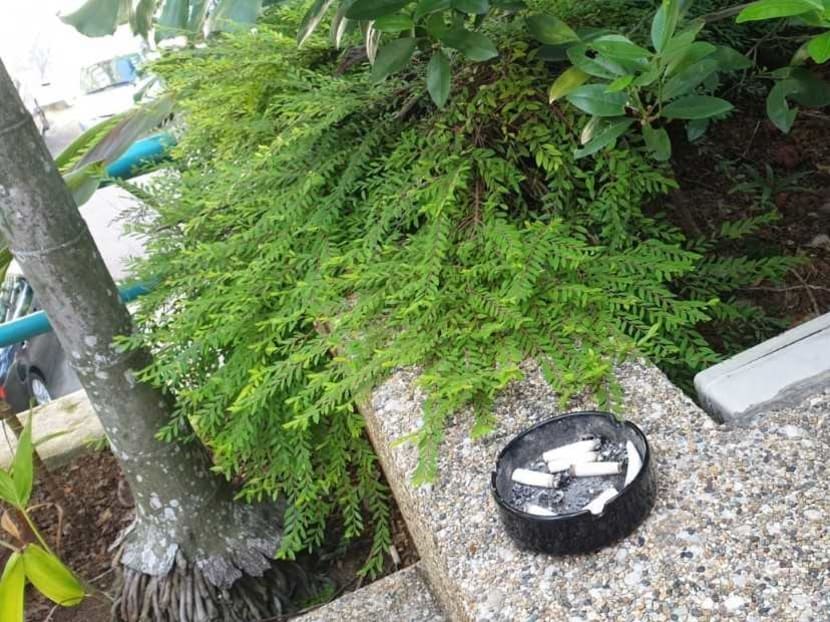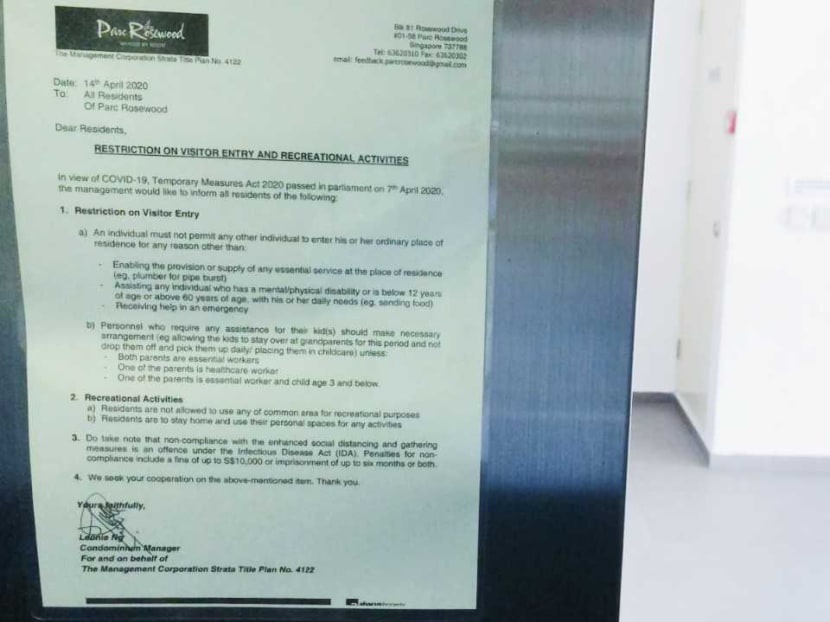Disobeying ‘toothless’ security guards, some condo residents flout mask requirement, safe-distancing rules
SINGAPORE — When a condominium resident was asked by a security staff member to comply with the new government regulation of wearing a mask when outside one's home, he retorted: “Who are you to ask me to wear a mask? You’re not an enforcement officer!”

A photograph supplied by a condominium resident who said smokers are continuing to congregate in common areas even after the tighter circuit breaker rules barring such activity were imposed, noting also that smoking is not possible while wearing a mask. The resident asked that neither his or her name nor the condo name be used.
SINGAPORE — When a condominium resident was asked by a security staff member to comply with the new government regulation of wearing a mask when outside one's home, he retorted: “Who are you to ask me to wear a mask? You’re not an enforcement officer!”
The anecdote was recounted to Mr Chan Kok Hong, managing director of Savills Property Management, by his staff. Savills manages 140 condominiums across Singapore.
Staff at managing agent firms and condominium council members are “toothless tigers” when it comes to enforcing government regulations at private estates, said Mr Chan, 73, largely because they are not authorised to issue fines to residents nor take down the particulars of those who infringe the laws within the property.
Despite an announcement made by National Development Minister Lawrence Wong last Tuesday (April 14), mandating everyone to wear masks if they are out of their homes, some condo residents appear to believe that they are exempt since they live in private compounds.
On Monday, the Building and Construction Authority (BCA) said it had issued fines of S$300 each to four residents who had been caught for flouting circuit breaker rules while using their estate’s pools or failing to wear a mask. Under the rules, all common areas in condominiums are not to be used, including pools. One management corporation was fined S$1,000 for failing to close common facilities.
MANY 'STILL IGNORING CIRCUIT BREAKER RULES' WITHIN COMPOUNDS
The concern most frequently raised by condominium residents interviewed by TODAY was neighbours whom they had spotted lingering in common areas without masks.
A 69-year-old real estate agent who lives at Pine Grove on Ulu Pandan Road, and wished to be known only as DT, said some of his neighbours were still ignoring the circuit breaker measures, and that he would see young families without masks playing on pathways within their estate. Children under two are not required to wear masks.
Ms Hillary Pang, 23, who lives at Ivory Heights in Jurong East said that her father was told off by a neighbour for reminding him to wear a mask when he spotted him sitting along a shared corridor without one on.
“People have the attitude that safe distancing isn't necessary in a condominium. They feel that since it’s a gated community, they are immune to the new laws,” said Ms Pang.
However, she added that while several of her neighbours appear to regard themselves as being above the rules, many residents are dutifully adhering to the new measures.
SOME MANAGEMENT COUNCILS, RESIDENTS SEEK RELAXED RULES
Estate managers said that management councils, which are made up of unit owners or their nominees to represent the collective interest of all residents, are part of the problem when it comes to rule enforcement.
Mr Sheikh Hakim, who manages two condominiums, said that the councils under his purview have tried to bargain with his team for a reduction in restrictions.
“Some were against the closure of facilities, but we had to strongly advise them to adhere fully to the new laws,” he said.
Mr Chan added that laws like the one barring any visitors during the circuit breaker period have made it easier for law enforcement, as they override the laws pertaining to the control of the management corporation.
However, he said that he is also wary of placing the responsibility of rejecting visitors on his security team, as he felt the onus should be on residents not to receive any guests.
Some property management teams have had better luck with enforcing the enhanced measures.
CBRE Property Management said it had increased the frequency of its security patrols, which had proved effective in deterring residents from lingering in estate common areas. The firm operates about 15 premium estates such as The Sail, D’ Leedon and Reflections at Keppel Bay.
The firm said it had ensured that lifts leading to communal facilities are no longer able to stop at the levels where such facilities are located, and had also closed communal toilets.
"There is also community effort where residents who witness others flouting the rules utilise the oneservice app to report on incidents,” a CBRE spokesperson said.
The oneservice app was developed by the Municipal Services Office, which is under the Ministry of National Development. It allows people to report on municipal matters easily without needing to know which agency is responsible for them.

An example of a notice on the tighter circuit breaker rules, directed at residents, posted by Abacus Property Management at a condominium it manages. Photo: Abacus Property Management
Mr Royston Chong, the executive director of Abacus Property Management, said that residents under his portfolio have generally been compliant with the circuit breaker guidelines, which he attributes to the stern notice his team issued to residents.
He said that instead of writing “love letters” or using positive hashtags, his team would inform residents through a written notice that they would be reported to the relevant authorities if they are found flouting rules.
“I know some condo committees are more relaxed in their language in their advisory, which has misguided residents into thinking that these measures are merely recommendations,” he added.
MANAGEMENT TEAMS TOO LAX, SAY SOME RESIDENTS
Conversely, some residents said that their management agents have been weak at enforcing the circuit breaker guidelines.
One such resident, 54-year-old Ms Audrey Chua, said she felt unsafe in her estate, which she did not want to identify, as security guards manning the main entrances do not screen incoming visitors.
The guards also fail to patrol the estate to ensure that residents observe the circuit breaker restrictions. Ms Chua, a real estate company owner, said she had seen young families and their domestic workers milling about the condominium without masks.
Another resident who lives in Ms Chua’s compound, a 68-year-old freelance nurse who declined to be named, said she had observed the same practice, and raised concerns of poorly-run cleaning procedures at the estate.
“I don’t even know if my own letterbox is clean or safe to open. They are not cleaning the lift lobbies properly. The cleaner can even sign off that they cleaned at 3pm when it is only 1.30pm,” she said, adding that she also felt vulnerable in her neighbourhood.
Residents from this estate also presented TODAY with photos of management staff smoking cigarettes in common areas after the circuit breaker had been introduced.
Those living in smaller complexes with no onsite managing agents told similar tales.
Mr Trevor Lee, who is in his 50s and lives in a small condominium complex in the Bendemeer area, which he declined to disclose, said that nothing has been done to stop his neighbour from receiving guests every night since his property is managed remotely via security cameras.
When contacted by TODAY, BCA said that all management corporations, including those without full-time managing agents onsite, must take steps to ensure that the residents comply with the circuit breaker measures during this period.
Management corporations can “provide feedback” on uncooperative individuals to BCA, which said it would investigate the issue and take action against errant parties.









